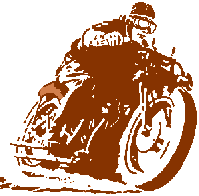don't remember learning the word gravel. Like earth, air, water and fire, it was a part of the rural environment I was born into. Driveways, county roads, even many state and interstate highways were paved with it. County roads tended to have two tracks roughly in the center where the traffic had packed down the gravel to a rock-hard consistency. Elsewhere, it was loose and unstable. Driving in loose gravel was hazardous. It could grab a wheel and throw you into a ditch before you could say, "Lordamighty!" . But everybody had to do it. When you met another car, you both had to get out of the center tracks and into loose gravel to pass. People with good sense slowed down to a crawl when they saw a car coming their way. Natural selection had its way with the rest.

One of my earliest recollections--I must have been three or four years old--is of watching a motorcycle streak past our house. The rider is wearing a leather Lindberg-style aviator's cap with chin strap and goggles. He is strained forward, his head even with the handlebars, lips pulled back in a gritted grin, and dragging behind a great boiling rooster tail of dust The high-pitched blat of the engine is marvelously ear-shattering. As he is blotted out by the trailing dust, the engine suddenly stops, cuts off in mid- blat. Those around me stare open-mouthed into the dusty distance. Then someone says, "Loose gravel!" And they all rushed out and down the road. In the next scene, the motorcycle is returning at the pace of a fast walk, the engine emitting slow and respectful putt-putts, the rider pasty faced and shaken. A white, blood-spotted handkerchief has replaced the aviator cap and goggles and another encircles his elbow. "Damn fool," somebody says as he passes.
When I was five, we moved to another farm much farther from town. Our nearest neighbor was half a mile away. My brother, who was a couple of years older, and I were exploring our new place when we heard voices coming from the road nearby. We investigated, hiding our presence in the tall ragweeds growing in the road ditch. Four boys about our age were passing. My brother, driven by instinct, picked up a rock, popped up, shied it at the group and quickly stooped down again.
"Ow!" one of them said.
"Whatsamatter?"
"Somebody's throwing gravels."
We knew right away they were trash. They didn't even know how to talk. Who ever heard of gravels ? Gravel was what you called a bunch of rocks. If you had two bunches or ten or a hundred, it was still just gravel. Only somebody who was ignorant would say throwing gravels when they meant throwing rocks.
Eventually, we became friends with them, bosom companions even, but we were never able to teach them not to say gravels.
They also said rottons , as in, "That apple is full of rottons." But I digress.
I must have been in my early teens when the word gavel entered my vocabulary. As most of my lexical stock and trade, it first became a part of my reading vocabulary. Now your grasp of the words in your reading vocabulary can be much more tenuous than those in your speaking or writing vocabulary. You are not required to settle on a specific meaning, a general hint is enough, since the context will in most cases keep you straight. And, of course, it is not mandatory you learn the proper pronunciation and spelling.
My mind, following some principle of parsimony of its own devising, apparently didn't even bother to create a new entry for gavel. It just made it a variation of gravel, a specialized something you hit with. And it's meaning was overlaid with the meaning of gravel which, having been around from the first, was much stronger. So a chairperson controlled a meeting with a wooden mallet or by shying rocks at the members or both.
My mind's stinginess with word space presented a problem when the word passed into my oral and written vocabulary. I didn't always remember to drop the r and consequently created low estimates among my audience as to the size of my IQ. But perhaps it all balances out, since I daresay language for me is much richer than those with more normal minds.
And then, along came the word grovel, which was slipped into the same slot as gravel and gavel. Grovel, for me, evokes the picture of some poor wretch who has been beaten about the head and shoulders with a wooden mallet until he is forced to fall upon hand and knees in loose gravel to plead for mercy. And for such vivid, graphic detail all I have to do is be careful to use an o instead of an a in the first vowel. I must never say that the slave graveled before his master for therein lies ambiguity.